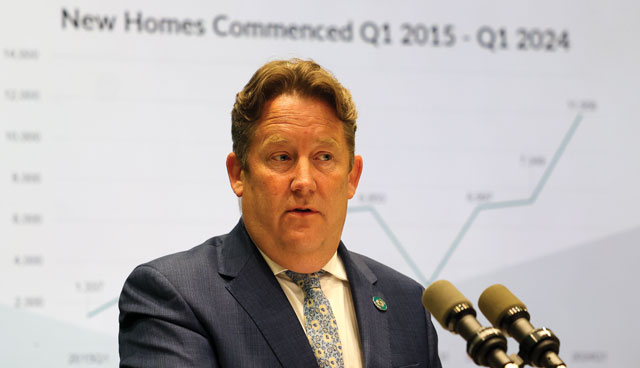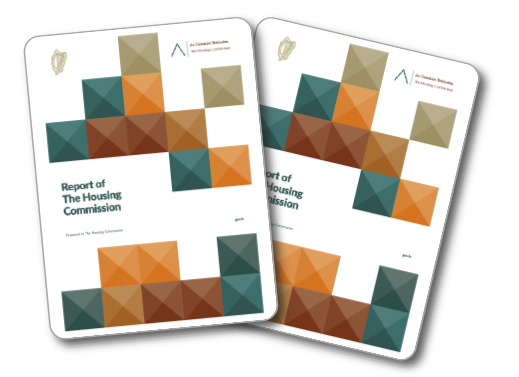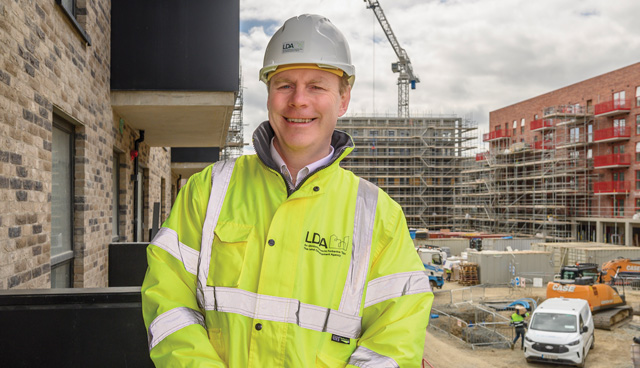
Housing Agency CEO Bob Jordan: Rising to the housing challenge
4th July 2024
Cover story: A partnership approach
4th July 2024Decades of housing interventions have not resolved ‘fundamentally systemic failures’

Only a “radical strategic reset of housing policy” will address a long-standing failure to adequately recognise housing as a critical social and economic priority, the Report of The Housing Commission has asserted.
Setting out its recommendation that housing must be “a unique national priority”, The Housing Commission assesses that confidence in housing has been undermined by a lack of consistency and identified “ineffective decision-making and reactive policy-making” an arena where “risk aversion dominates”.
The report adds that coupled with external influences impacting housing dynamics, these challenges contribute to volatility in supply, which undermines affordability in the housing system.
The result is that Ireland now has one of the highest levels of public expenditure for housing in Europe, yet one of the poorest outcomes.
Amongst its starkest findings, The Housing Commission estimates a housing deficit of between 212,500 and 256,000 homes, based on the Census 2022 figures. Major recommendations included reform of key supports such as the Housing Assistance Payment (HAP) and the Rental Accommodation Scheme (RAS), the establishment of a Housing Delivery Oversight Executive to identify and address delivery blockages, and a Social Housing Act, which would underpin a recommended target of 20 per cent of the national housing stock comprising of social and cost rental homes.
The Housing Commission was established in December 2021 by the Minister for Housing, Local Government and Heritage, Darragh O’Brien TD, as an independent body, with a brief to examine aspects of housing provision, such as tenure, standards, sustainability, and quality of life challenges.
After over two years of deliberation, the report containing 83 recommendations and hundreds of suggested actions was received by the Minister on 8 May 2024. Also included were two reports in relation to the wording of a referendum on housing.
Following publication of the report, the Minister will give consideration to the recommendations before bringing policy considerations to government. The report is expected to inform the forthcoming Housing for All action plan, and the revised targets due to be announced under the revised National Planning Framework.
Speaking to the Housing Ireland Magazine shortly after the report was made public, Housing Minister Darragh O’Brien TD says that around 70 per cent of the 83 recommendations were “either done or we are doing”, and outlined his belief that the report signalled that the Government should “stick with” the work it is doing on affordable housing.
Asked about The Housing Commission’s call for a “radical strategic reset of housing policy”, he said: “I do think that we need to always be radical in our thinking and I would agree with The Housing Commission on that. I do not see it as an endorsement of pure radicalism for radicalism’s sake.”
The Minister stressed that he would give the report full consideration before proceeding, but suggested that following an initial reading, there were some recommendations in the report that he is reluctant to implement.
Pointing to the recommendation to establish a Housing Delivery Oversight Executive as an example, he said he opposed the creation of “another layer to housing delivery”.
‘Emergency action’
In contrast to the Minister’s perspective that Housing for All has laid a foundation for steady progress, the Commission’s report calls for “emergency action” to deal with Ireland’s housing deficit as an overarching theme of the report.
Central to the recommendations is the need to plan for the right type of housing to meet changing population demands. It recommends basing housing policy on an assessment of the housing required for a well-functioning society and stresses that this should not be conflated with market demand or construction sector capacity.
“Too often analysis and projections of housing requirements are carried out based on making housing requirements equate to housing supply targets,” it says, and points to reform and reviews of the Housing Supply Targets and the Housing Need and Demand Assessment (HDNA) frameworks, to ensure that they fully account for key parameters underpinning housing requirements.
Underpinning an overarching recommendation for a detailed plan for the delivery of the right type of housing in the right locations and with the necessary supporting infrastructure are suggested actions that would alter the approach being taken to planning, construction, the rental market, financing, and infrastructure delivery.
On delivery, the Commission recommends enhancing the powers and resources of local authorities, in particular, it calls for local authorities to develop ‘land activation units’ “to facilitate and promote strategic development of public and private housing”. Meanwhile, also proposed is a “whole of government” programme of infrastructure delivery aligned with strategic ‘housing delivery zones’.
In addition to supplying housing in the right locations, the Commission says it is critically important to ensure that housing delivery “reflects a more appropriate distribution of household size”. To this end, it says there is a need within the upcoming revision of the National Planning Framework to consider the increased prevalence of urban sprawl around Dublin.
Where previously the National Planning Framework focused on regional growth and expanding the capacity of the cities outside of Dublin, the Commission says that a scenario which sees these cities grow at a greater rate than the capital in the coming decades is at odds with the disproportionate foreign capital and job creation taking place.
The Commission outlines that by placing constraints on Dublin’s growth, the NPF has “driven patterns of development and internal migration that have resulted in urban sprawl, traffic congestion, and long commute times for workers”. It recommends that regional growth policy in housing should “facilitate the growth of Dublin city and the broader metropolitan area”.
‘Funding anchor’
Advocating for a targeted increase in the proportion of social and cost rental housing in the State to 20 per cent of the national stock, the Commission’s report focuses heavily on the importance of long-term financial commitments to the State.
A key characteristic of a well-functioning housing system, it outlines, is that: “The State must provide a stable funding anchor that is constant in nature, but this must also be complemented by diverse international sources, to finance the increase in housing supply”.
Insisting that the State should provide as much certainty to the market as possible, the Commission invites analysis to be carried out on the viability and effectiveness of a specific private savings fund, which would be used to assist in the funding of housing.
Interestingly, amidst its analysis of the capacity of the construction sector to deliver on future ambitions, The Housing Commission calls for the creation of a central Construction Supply Unit to coordinate, monitor, and track all major public sector construction projects in the State, and proposes the introduction of a national Housing Procurement Strategy, to promote “collaboration between contracting parties and the supply chain to support the delivery of housing”, and reform the Public Works Contracts with a new focus on collaboration and dispute resolution.
Cost rental
The Commission advocates reform for both tenants and landlords, to provide a balance and make the rental market attractive for both parties. Advocating the for delivery of cost rental housing “at scale”, it backs the Government’s stated intention of cost rental becoming the main form of supply for social and affordable housing units.
A system of “reference rents” is proposed as part of a reform of current rent regulation. Other reforms of the rental sector encompass rent pressure zones (RPZs), a measure which the Commission says must be made “fit for purpose”, seven years on from their ‘temporary’ introduction.
Meanwhile, the Commission recommends a reset reforms to the Housing Assistance Payment (HAP) and the Rental Accommodation Scheme (RAS), ensuring they are “short- to medium-term support measures for households eligible for social housing”.
Outside of the rental market, the Commission calls for review and recalibration of measures that assist with access to home ownership for first-time buyers, alongside a comprehensive Housing Affordability Index to track trends in housing affordability, both nationally and in urban areas.
Social housing
Amidst a range of recommendations, a cornerstone of The Housing Commission’s analysis of the social housing sector is the call for a standalone Social Housing Act, which sits apart from other housing legislation, and “protects the social purpose of the social housing sector and prohibits privatisation”.
This, it suggests, should be underpinned by a sustainable financing model for social housing by setting social housing rents at cost recovery rates and ending the system of selling local authority dwellings to tenants at substantial discounts relative to current market value.
Opposition
Setting out the next steps for The Housing Commission report (Figure 1), the Minister outlined his understanding that 65 of the 83 actions, or 78 per cent of the recommendations were already implemented, underway, or partially underway.
“As would be expected, not everything in the reports released today is accepted or agreed and a full analysis will be required before actions are taken,” he stated.
“There is much more work to be done and the work published today will contribute to a robust and informed policy debate and will certainly inform the direction of housing strategy into the future.”
However, Opposition housing spokesperson Eoin Ó Broin TD described the report as a “damning criticism of government housing policy”.
“The fact that a government-appointed body of experts has levelled such damning criticism at the government’s housing policy is further evidence that their own housing plan is not working. It is also clear that they have no intention of changing course now,” he said.
Speaking to the Housing Ireland Magazine about the Minister’s assertion that the recommendation for a Housing Delivery Oversight Executive is unlikely to be progressed, the Sinn Féin TD said: “I think he misunderstands what they are proposing; they are not proposing a new level of bureaucracy. We have a real issue, which is different state agencies and the private sector have different capital programmes that are not aligned to Uisce Éireann, Gas Networks Ireland, ESB Networks, our local authorities, our approved housing bodies, and the private sector developers.
“If I understand the proposition right, it is more about a statutory mechanism to bring those different groups together, to align their medium- to long-term capital programmes and to remove obstacles in the short term. Certainly, that is something worth considering.”
Labour’s housing spokesperson Ivana Bacik TD has also accused the Government’s housing policy of failing “on all metrics”. Expressing concern over latest homelessness figures, the opposition party leader said: “House prices are up, homelessness is up, and evictions are up. The current Government has repeatedly shown that they cannot manage the housing crisis effectively. It is evident that without substantial state intervention, the housing market has spiralled out of control.
“It is time for the Government to admit that their approach is not working. We need substantial state intervention to correct the housing market and ensure that every person in this country can live in a safe, secure, and affordable home. The time for excuses is over; it is time for action.”







